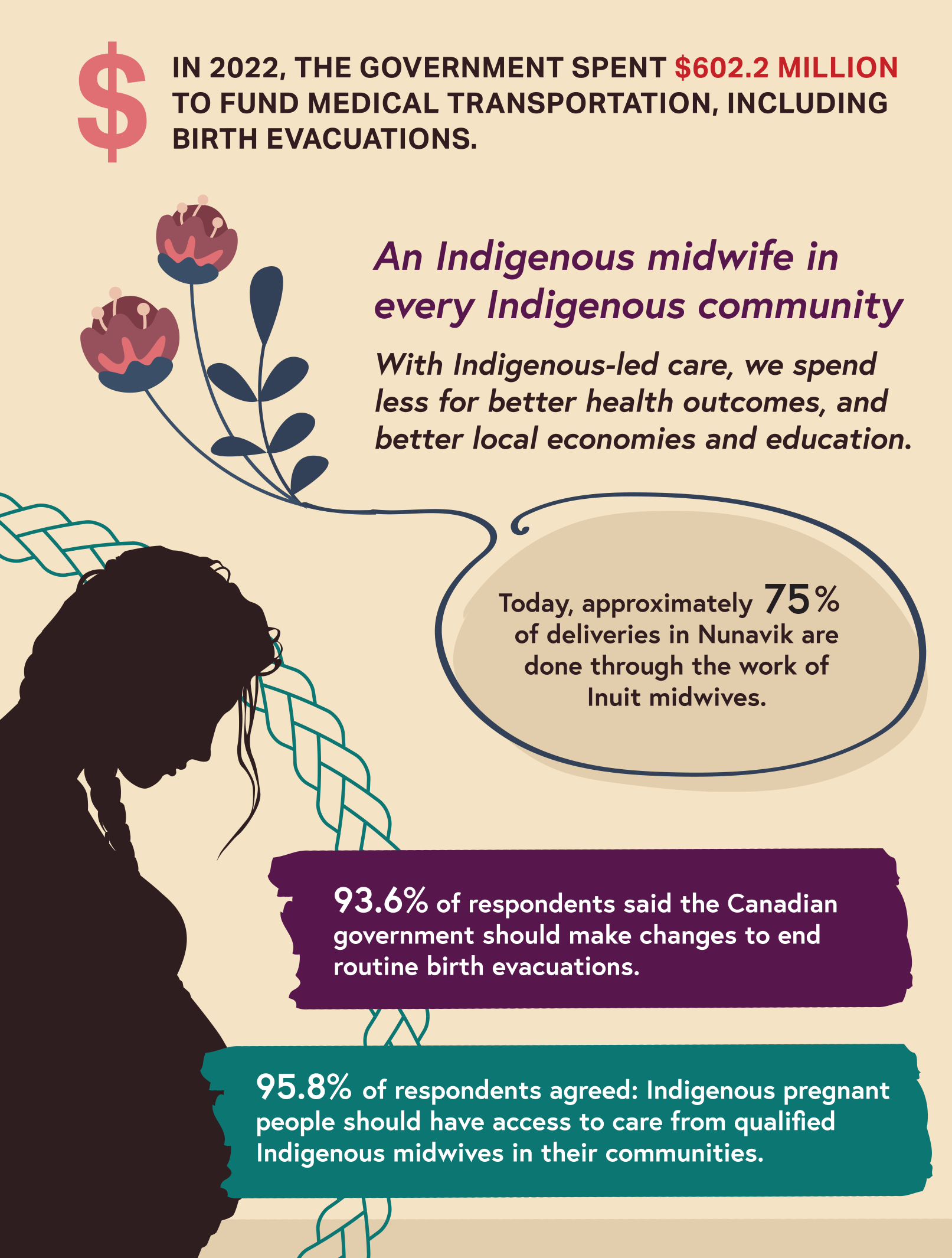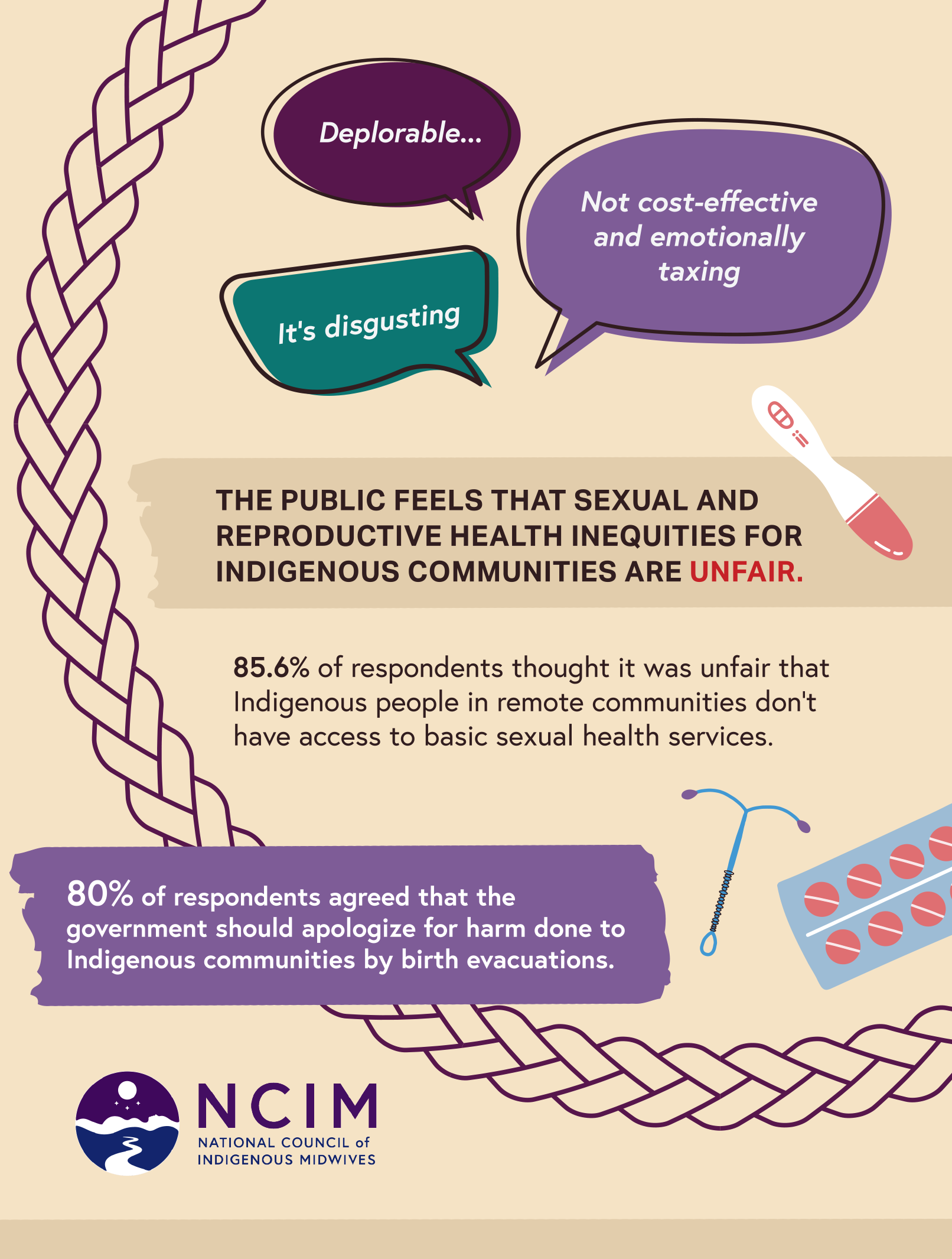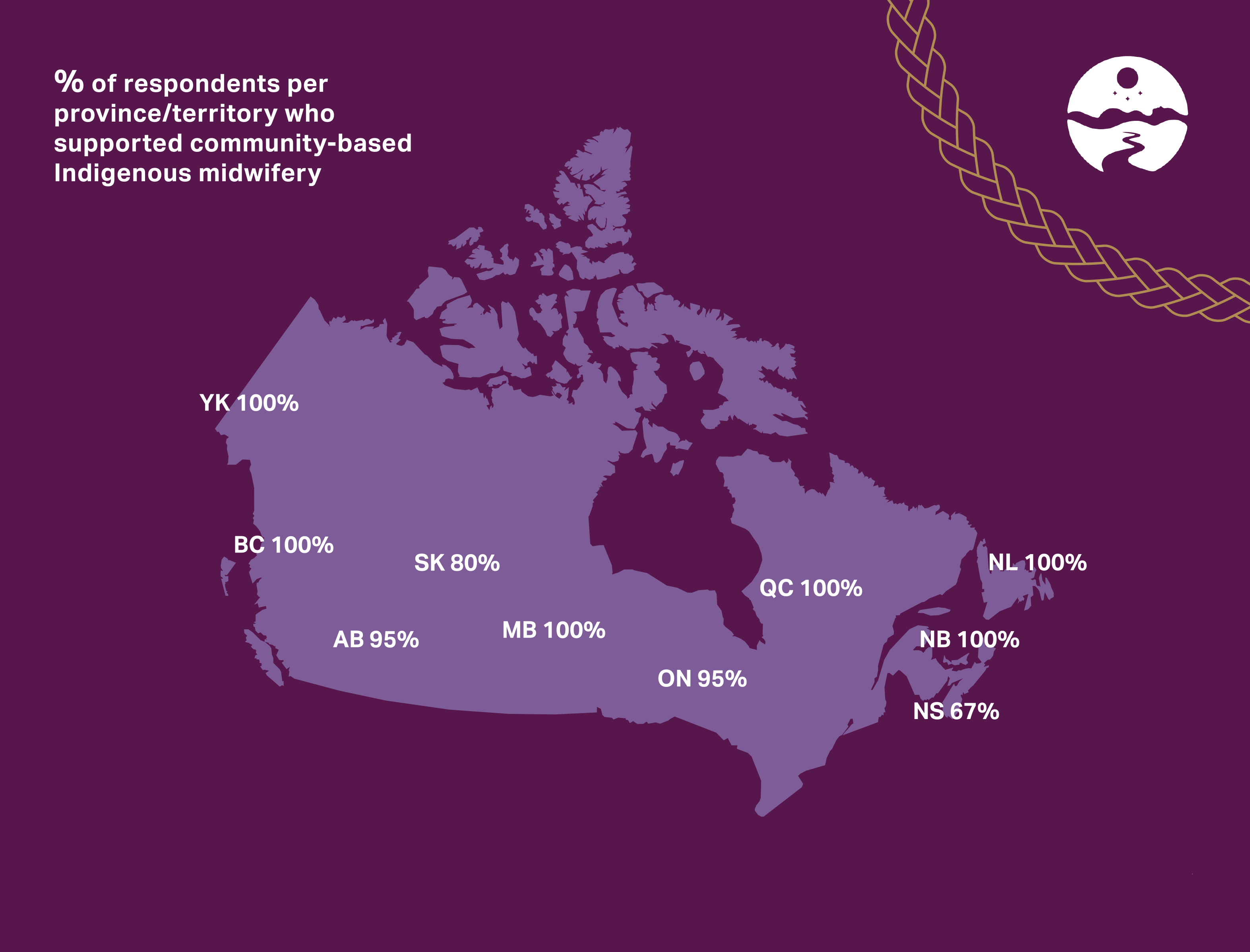Birthing parents should be surrounded by their families, Elders and Knowledge Keepers, the land to which they are connected and have access to traditional ceremonies.
– Melanie Omeniho, President of Les Femmes Michif LFMO
LEARN MORE
FAQ
In remote Indigenous communities across what’s known as Canada, many healthy, low-risk pregnant people are forced to give birth hundreds of km away from their families, culture and language. This practice is colloquially known as forced birth evacuations.
Forced birth evacuations are part of longstanding federal health policy.
Birth evacuations often occur because many rural and remote Indigenous communities don’t have access to sexual and reproductive health care, including birthing facilities and health care professionals. In many cases, people must travel out of community just to access contraception, STI testing and basic prenatal care.
Forced birth evacuations are cruel, costly and unnecessary.
Cruel
In many cases, Indigenous lifegivers are evacuated out weeks before birth, often alone. They frequently end up in transitional housing, without their support network, and risk being exposed to anti-Indigenous racism in the health care system.
The experience is often traumatizing and results in negative health outcomes for Indigenous lifegivers and their infants. Infant mortality and morbidity rates in Indigenous communities are higher than any population in Canada.
Costly
In 2022 the federal government spent $602.2 million to fund medical transportation, including birth evacuations. This money should be reallocated to provide sustainable, in-community health services, such as Indigenous midwifery.
Unnecessary
Some people will need to leave their community to give birth. However, the routine and blanket evacuation for all births, including low-risk pregnancies, is unnecessary and contributes to poorer birth outcomes for Indigenous Peoples.
Giving birth in community is safe; communities under the care of a community midwifery program with careful risk screening can have better health outcomes than communities which have a blanket evacuation policy.
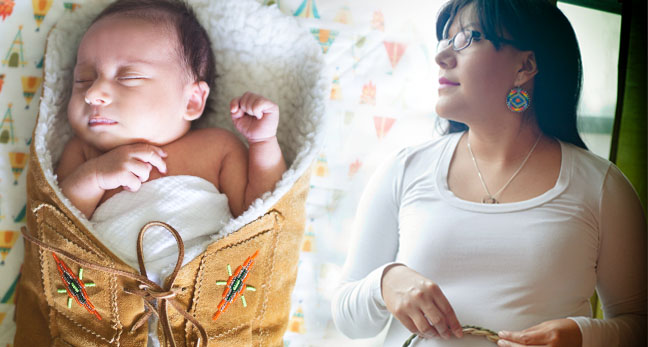
An Indigenous midwife is a committed primary health care provider who has the skills to care for pregnant people, babies, and their families throughout pregnancy and postpartum.
Indigenous Midwives:
- are knowledgeable about all aspects of women’s sexual and reproductive health
- provide education that helps keep the family and the community healthy
- promote breastfeeding, nutrition, and parenting skills
An Indigenous midwife is the keeper of ceremonies, a leader and mentor, and someone who passes on important values about health to the next generation.
Indigenous midwives were once a cornerstone of every Indigenous community. It has only been in the last hundred years that this practice has been taken away from our communities—a result of colonization and ongoing systemic racism in the Canadian health care system.
As a result of losing midwifery, important leadership in the health care delivered to Indigenous communities and families was lost. Access to primary care around sexual and reproductive health, maternity and maternal-child care was compromised. This has had a devastating impact both on the preservation of culture and on maternal and newborn health outcomes in Indigenous communities across Canada.
Despite this, there are Indigenous midwives practicing in communities across Canada. Increasing the number and capacity of Indigenous midwives fulfills the Truth and Reconciliation Commission’s Calls to Action to recognize the value of Indigenous healing practices, and to increase the number of Indigenous professionals working in the health care field.
NCIM advocates for the return of birth to Indigenous communities through the expansion of Indigenous midwifery services, and an end to forced birth evacuations.
We are calling for increased federal funding for in-community Indigenous midwifery services, in part via a reallocation of funds from unnecessary birth evacuations.
Our voice is joined by the Assembly of First Nations, national Indigenous women’s organizations Pauktuutit Inuit Women of Canada and Les Femmes Michif Otipemisiwak (Métis women), as well as allied medical associations like the Canadian Association of Midwives and the Society of Rural Physicians of Canada.
MORE RESOURCES
Over 80% of Canadians agree—the federal government should apologize for the harm done to Indigenous communities by birth evacuations.
– National survey conducted November 22, 2023
PRESS RELEASE
September 26, 2023
Over 80% of Canadians agree—the Feds should apologize for the harm done to Indigenous communities by birth evacuations.
A national survey shows the public has been left in the dark about the reproductive health inequities of Indigenous people in rural and remote communities.
Tiohtiá:ke/Montreal/Unceded traditional territory of the Kanien’kehá:ka Nation – People across Canada agree – the Federal government should publicly apologize to Indigenous (First Nations, Inuit, and Métis) communities for routine evacuations of low-risk pregnant people from their communities for birth, a practice known colloquially as “Birth Evacuations.”
The National Council of Indigenous Midwives (NCIM) conducted a national survey in November 2022 to understand public perception of Indigenous midwifery and birth evacuations. 312 people responded across ten different provinces and territories. Here is what they said:
Over 50% of respondents did not know about birth evacuations and the extreme distances Indigenous people must travel to give birth. Each year thousands of Indigenous people are forced to leave their families and communities to give birth, often alone, in distant hospitals, as part of long-standing federal health policies. According to federal occupational guidelines for nurses, they leave up to a month before their due dates, residing in substandard housing with little access to birth education and adequate nutrition. Two-thirds of survey respondents were also unaware that currently, the federal government is mostly responsible for Indigenous healthcare on reserve.
Once survey respondents learned about birth evacuations, close to 95% agreed that the Federal government should make changes in Indigenous healthcare to end routine birth evacuations. Close to 80% agreed that the federal government should invest money from evacuations into Indigenous-led midwifery services in communities.
The survey results send a strong message to the federal government—birth evacuations are unfair and need to be addressed. As some respondents put it: “it’s mortifying and disgusting,” “deplorable,” and “not cost-effective and emotionally taxing.” As National Indigenous organizations working towards Indigenous women’s wellness and well-being, we demand the federal government invest in Indigenous midwifery services and education, especially in rural and remote communities.
- In 2022, it cost the federal government $602.2 million to fund medical transportation (35.5% of annual NIHB expenditures), which includes flying people out of communities to give birth.
- Community-based, Indigenous-led midwifery prioritizes access to local, remote and on reserve services that are relevant to community health needs. Services are culturally-rooted with demonstrated, clinically excellent care supporting improved sexual and reproductive health and adolescent health (SRHAH) for Indigenous communities.
- A great example of successful Indigenous-led midwifery began in Puvirnituq in 1986. Through the work of Inuit midwives today, approximately 92.2% of deliveries are done in Nunavik, while only 7.8% of women must travel to Montreal to give birth.
- Over 50% of survey respondents did not know about birth evacuations or the forced travel lengths for pregnant people.
- Over 85% of survey respondents agreed it was unfair that sexual health services in remote Indigenous communities are more difficult to access than services in the rest of Canada.
- Over 85% of survey respondents agreed it is unfair that Indigenous people are forced to leave their communities to give birth.
- Close to 95% of survey respondents agreed that the Federal government should make changes in Indigenous healthcare to end routine birth evacuations.
- Close to 80% of survey respondents agreed that the federal government should invest money from evacuations into Indigenous midwifery services in communities.
Official Statements:
“NCIM has known for decades that birth evacuations are a violation of inherent Indigenous rights, and the federal government needs to make changes to address this. These results show us that the public agrees and wants change from their elected officials.”
– Ellen Blais, Executive Director of NCIM, Onkwehonwe Midwife
“It is time for the Government of Canada to end the colonial practice of evacuating Métis and other Indigenous people from their rural or remote communities for low-risk pregnancies. During such a sacred time, birthing parents should be surrounded by their families, Elders and Knowledge Keepers, the land to which they are connected and have access to traditional ceremonies.”
– Melanie Omeniho, President of Les Femmes Michif FMO
Background information and Related Resources:
Birth Evacuations are the routine and blanket evacuation for all births for Indigenous peoples living in remote and rural communities in Canada. Evacuation for birth exposes Indigenous Peoples to the systemic bias, racism, and trauma that is part of Canadian health care systems and continues the trauma of colonization.
NCIM’s Position Statement on Evacuations for Birth
About
The National Council of Indigenous Midwives (NCIM) exists to promote excellence in reproductive health care for Inuit, First Nations, and Métis pregnant people.
We advocate for the restoration of midwifery education, the provision of midwifery services, and choice of birthplace for all Indigenous communities consistent with the U.N. Declaration on the Rights of Indigenous Peoples. For additional information on survey results, visit indigenousmidwifery.ca
Media Contacts:
Jo Muise, Communications & Engagement Co-ordinator, NCIM
jmuise@canadianmidwives.org
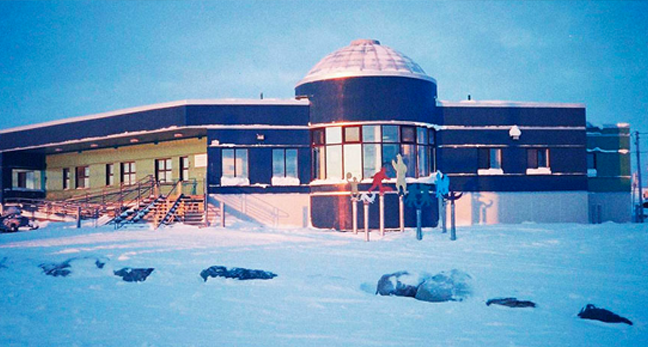
The National Council of Indigenous Midwives (NCIM) strongly condemns the routine and blanket evacuation of pregnant people for birth and demands the return of birthing services to all Indigenous communities. It is unacceptable that people must leave their communities and travel to large and usually southern centres to access maternity care services.
NCIM strongly advocates for the return of birth to all Indigenous, remote, and rural communities in Canada. It is vital that Indigenous Peoples are surrounded with all the love and support possible, which includes their families, community members, and the land.
Giving birth in-community is safe; communities under the care of a community midwifery program with careful risk screening can have better health outcomes than communities which have a blanket evacuation policy.
INDIGENOUS MIDWIVES IN THE MEDIA
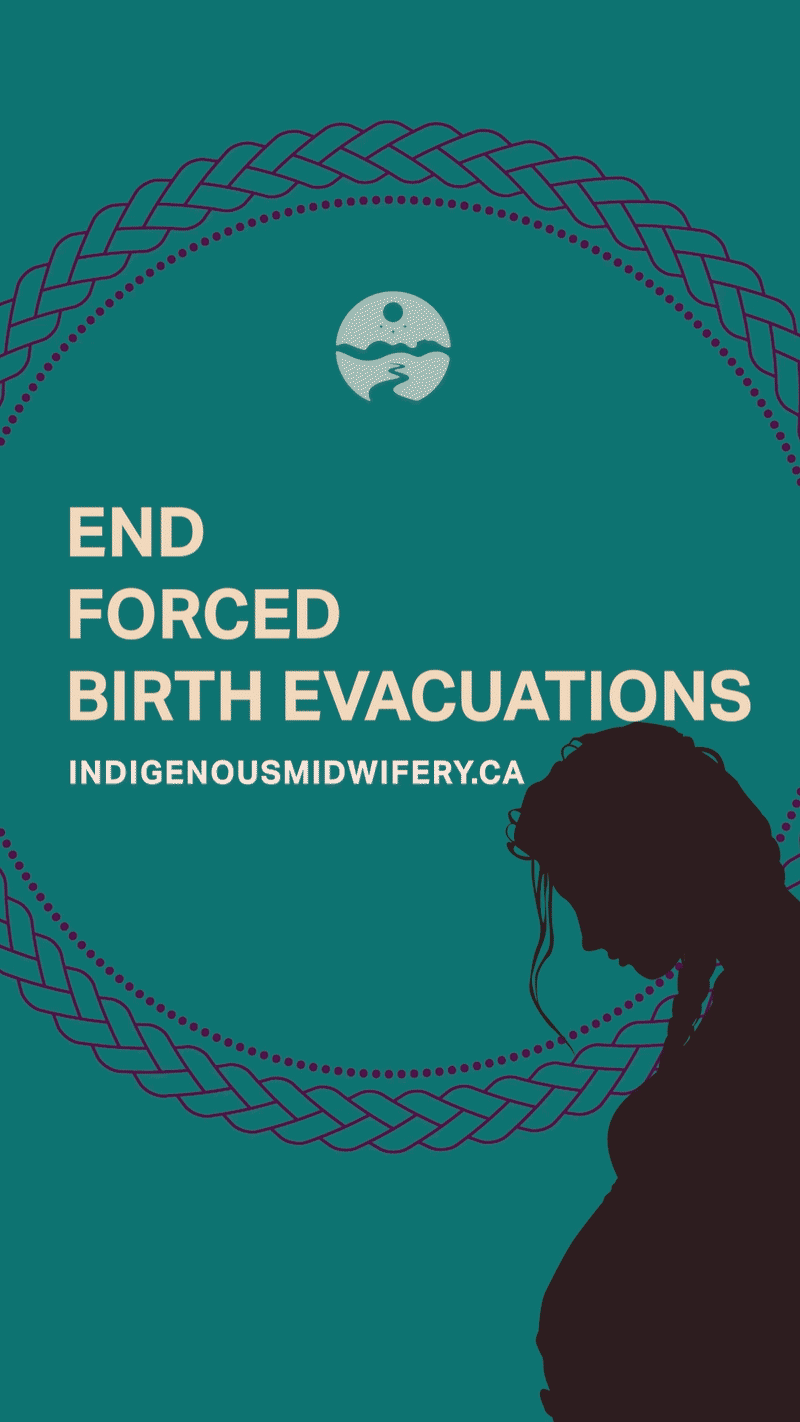
NATIONAL SURVEY RESULTS (2022)
312 people responded across 10 provinces and territories
